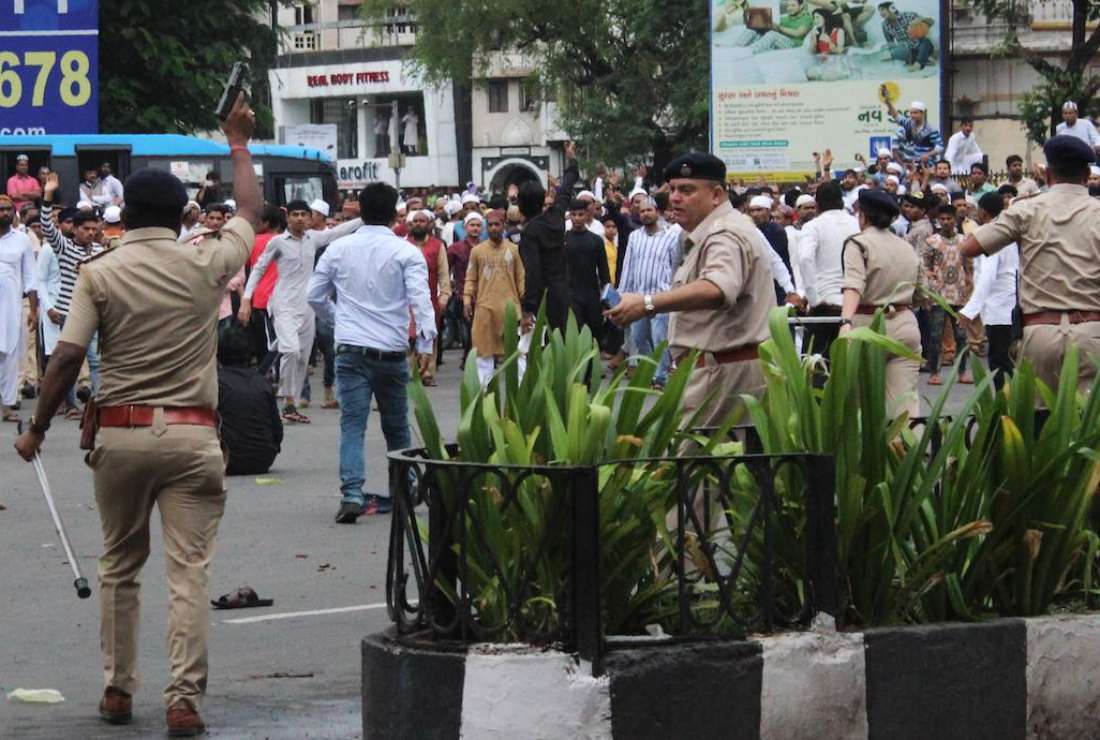
NEWSLETTERS
What’s happening in Asian Church
and what does it mean for the
rest of the world?



Updated: May 18, 2023 03:30 AM GMT

An Indian police officer (L) raises a handgun as police try to disperse Muslim demonstrators during a rally in India's Surat town on July 5, 2019 as they protested the lynching of Tabrez Ansari in Jharkhand state a fortnight previously. (Photo AFP/STR)
Two murders on camera shook India on April 15. Atiq Ahmed, a gangster in northern Uttar Pradesh state who faced at least 100 criminal cases, and his brother Ashraf Ahmed were shot dead while they were being taken for a medical check-up under the full glare of media cameras in the state’s Prayagraj city.
Atiq Ahmed's son Asad was also killed in an encounter with state police in the state’s Jhansi city just two days earlier.
They may have been criminals. But they, too, deserve a fair inquiry and justice. When we deny justice to alleged criminals, we are denying it to ourselves, which is the most fundamental dimension of ethics.
Debates on justice and fairness have a long history in our society. No concept has been more persistently associated with ethics and morals in our culture than the concept of justice.
Every significant work on ethics has believed that justice is a fundamental component of morality, from the ancient Greek philosopher Plato's “Republic” to the late Harvard philosopher John Rawls' "A Theory of Justice." The Indian-origin Nobel laureate Amartya Sen extended this notion in his “The Idea of Justice.”
Giving each person what they deserve, or, in more formal terms, their due, is what is meant by justice. Today, the terms justice and fairness are frequently used interchangeably because of their close relationship. However, there have also been more definite interpretations of the two terms.
Fairness has also been used to refer to the capacity to make decisions that are not overly general but that are concrete and specific to a given case. While justice is typically used in reference to a standard of rightness, fairness (or equity) is frequently used in regard to the capacity to judge without reference to one's feelings or interests. In any event, the idea that everyone will receive the treatment they deserve is essential to both justice and fairness.Questions of justice or fairness invariably arise when individuals disagree over what they think should be given or when choices need to be made regarding how rewards and burdens should be shared among a group.
In fact, the majority of ethicists now believe that if it weren't for the conflicts of interest that arise when resources are limited and people disagree over who should get what, there would be no need to discuss justice or fairness.
We need justice principles that everyone can agree upon as reasonable and fair benchmarks for judging what people deserve when such disputes occur in our society.
However, giving each person what they are due does not get us very far in terms of fairness. How can we decide what each individual deserves? What standards and guidelines should we use when figuring out what is owed to this or that person?
The Principles of Justice
The tenet that "equals should be treated equally and unequals, unequally" is the cornerstone of our justice system. It has been largely recognized so since Aristotle first articulated it more than 2,000 years ago.
The same idea is also stated in modern parlance: "Individuals should be treated the same unless they differ in ways that are relevant to the situation in which they are involved." For instance, if Ram and Ravana perform the same task and there are no material distinctions between them or their task, then it is only fair that they receive equal compensation. Because race and sex are irrelevant in typical work settings, it is discrimination if Ram is paid more than Ravana just because he is a man or because he is of a higher caste.However, we see numerous distinctions as acceptable grounds for treating people differently.
For instance, we believe it is fair and just when a parent gives his or her own children more thought and consideration in his or her private affairs than he or she does for the children of others; we believe it is fair when the person in line first for theater tickets receives first choice; we believe it is just when the government provides benefits to the needy that it does not provide to more affluent citizens; and we believe it is just when some who have done wrong are given punishments that they do not receive from others.
Therefore, we acknowledge many factors as justifying differential treatment, including need, contribution and effort.
On the other hand, there are other factors that, in our opinion, are not grounds for treating people differently. For instance, in the workplace, we typically believe that it is unfair to treat people differently based on their age, sex, color, or preferred religion.
We consider it unfair if the brother of the director of public works receives a large and expensive contract to install sprinklers on the municipal golf course despite lower bids from other contractors, or if the judge's nephew receives a suspended sentence for armed robbery while another offender unrelated to the judge goes to jail for the same crime.
We also think it is unfair to punish someone for something they had no control over or to not make up for the harm they endured.
Unfortunately, injustice has become ingrained in our culture. That does not grant us the authority to impose our own laws. Only after a fair and just judicial process must the unfair parties be punished. Even the unjust deserve to have justice served.
Coming to the Church, it needs to be seen as treating people with justice, fairness and equity. Its basic message is the justice of God, which judges everyone fairly.
Thus the premeditated murders of Atiq Ahmed, his brother and his son Asad were unjust. They cannot be justified because they might have been criminals! “Instant vigilante justice” can never be justified in an ethical or civilized society!
*The views expressed in this article are those of the author and do not necessarily reflect the official editorial position of UCA News.
Help keep UCA News independent
The Church in Asia needs objective and independent journalism to speak the truth about the Church and the state. With a network of professionally qualified journalists and editors across Asia, UCA News is just about meeting that need. But professionalism does not come cheap. We depend on you, our readers, to help maintain our independence and seek that truth. A small donation of US$2 a month would make a big difference in our quest to achieve our goal.















